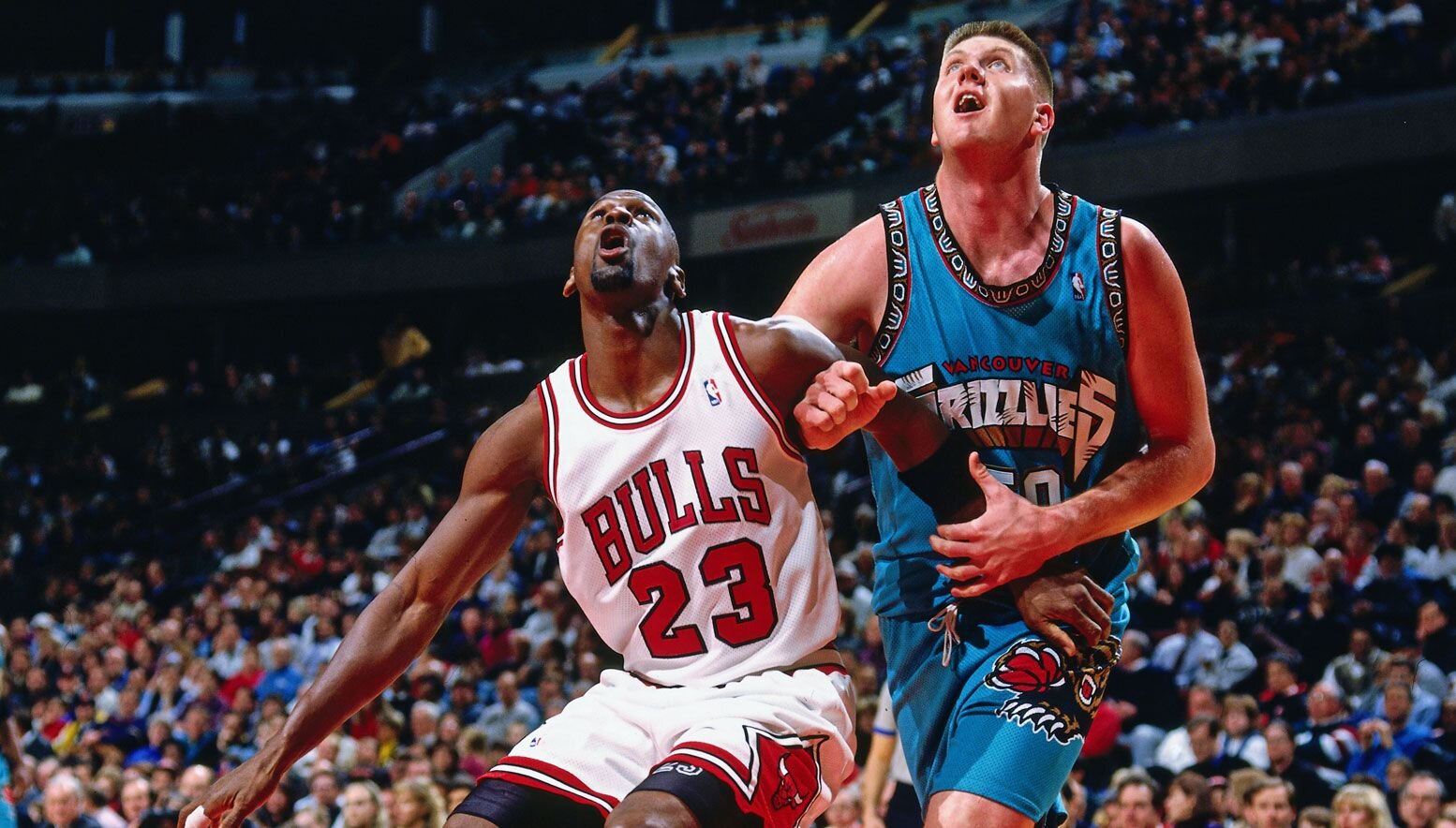Standing nearly seven feet tall and packing a granite-like 280 pounds, Vitaly Potapenko usually flattened opponents in his way during his NBA playing days.
That’s why the “Ukraine Train” won’t forget one collision that stopped him in his tracks.
“We’re playing Chicago and I go to set a screen,” said Potapenko, a Grizzlies assistant coach who spent 11 seasons as a journeyman center. “I’m known for setting really hard screens. So I drilled him pretty well. Sometimes you hit guys, especially guards, and they get rattled a bit. But not this guy. It didn’t faze him. He didn’t budge. You found out quickly he’s built differently.”
That unfazed guy on the other end of Potapenko’s vicious screen was Michael Jordan.
That year was the 1997-98 NBA season, Potapenko’s second with the Cavaliers.
And that memorable run-in is one of many that connect the Grizzlies with an iconic Jordan and his dynasty Bulls teams chronicled in ESPN’s highly-acclaimed ‘The Last Dance’ documentary.
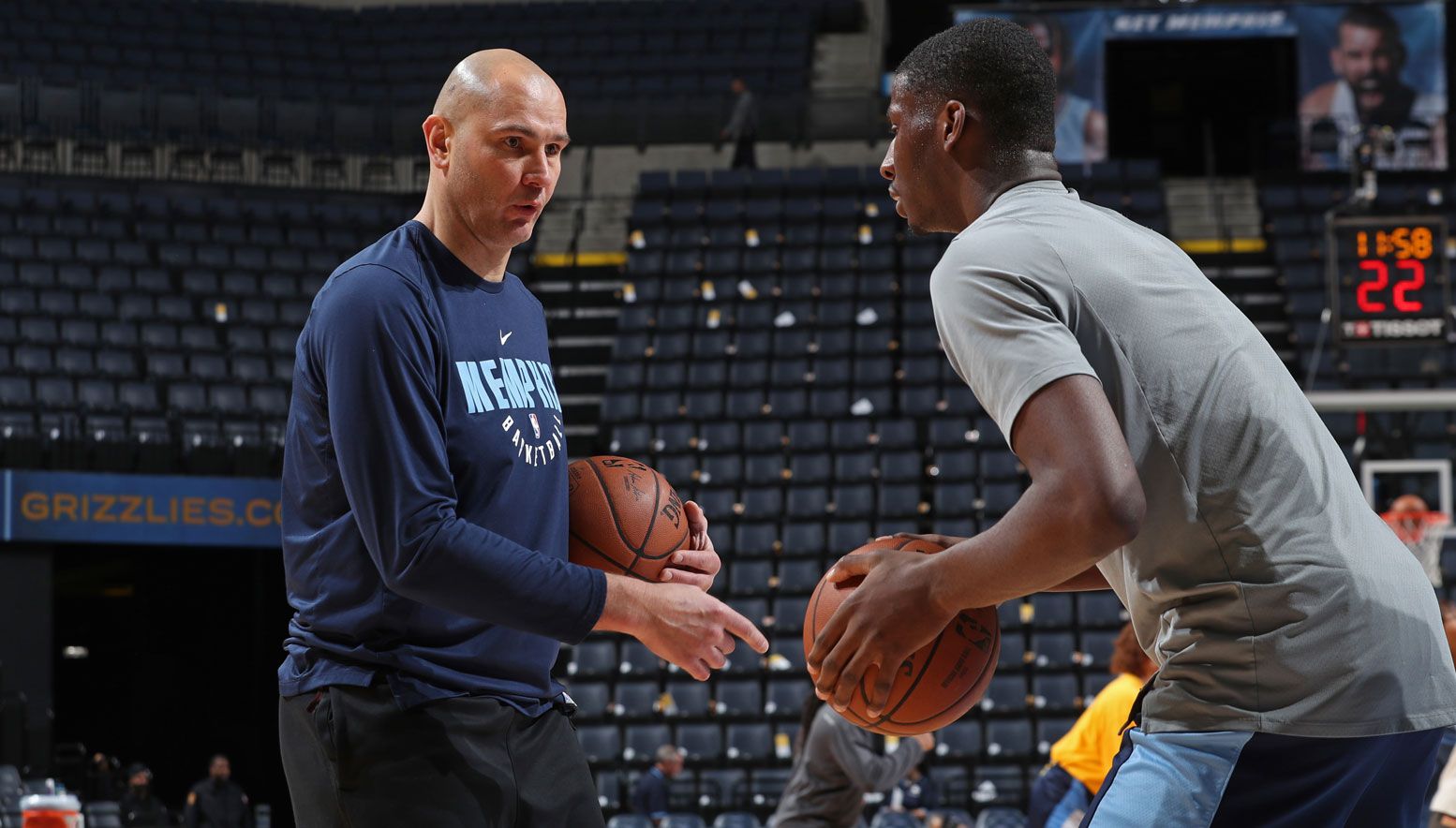
The series focuses specifically on the turbulent 1997-98 season, when Chicago completed a second run of three straight NBA titles while enduring turmoil in Jordan’s final run with the Bulls. All these years later, Potapenko still marvels at the toughness and durability that allowed Jordan to suit up at least 80 games in 11 of his 14 full seasons and complete all 82 nine times.
I’m known for setting really hard screens. So I drilled him pretty well. Sometimes you hit guys, especially guards, and they get rattled a bit. But not this guy. It didn’t faze him. He didn’t budge. You found out quickly he’s built differently.
Between chasing his young kids around at home in Memphis on weekends, Potapenko catches doses of nostalgia watching ‘The Last Dance’ – just like almost everyone else. This past Sunday’s episodes marked the midpoint of the 10-part documentary, which averaged 6.1 million viewers and generated more than nine million social media impressions during last month’s debut.
“It was a trying year,” Jordan reflected on ABC’s ‘Good Morning America’ leading into the premiere episodes. “We all were trying to enjoy that year, knowing it was coming to an end. At the beginning of the season, it basically started when (Bulls general manager) Jerry Krause told (coach) Phil Jackson that he could go 82-0 and he would never get the chance to come back.”
Lines were drawn. The stage was set for a controversially epic season.
“Knowing that, I married myself to (Jackson), and if he wasn’t going to be the coach, I obviously wasn’t going to play,” Jordan continued. “So Phil started off the year saying, ‘This is the last dance,’ and we played it that way. It tugged at you throughout the course of the year, knowing this had to come to an end. But it also centered our focus to make sure we ended it right.”
We all were trying to enjoy that year, knowing it was coming to an end. At the beginning of the season, it basically started when (Bulls general manager) Jerry Krause told (coach) Phil Jackson that he could go 82-0 and he would never get the chance to come back.
That climatic ending of ‘The Last Dance’ will play out the next two Sundays in the four remaining episodes. The documentary has been a saving grace for basketball-starved fans who have been without NBA action since the season was suspended March 11 amid the Coronavirus pandemic.
In Memphis, the series is appointment viewing for many Grizzlies’ staffers, executives and analysts. That group includes former NBA players who faced those 1990s Bulls, and others who had later ties to Jordan, arguably the greatest and most influential athlete in pro sports history.
“From my rookie year in the league, he was already to that point where you’re like, ‘Man, that’s Jordan out there on the floor against you,’” said Grizzlies executive Elliot Perry, whose decade-long NBA career started when he was drafted out of Memphis two weeks after the Bulls won their first title in 1991. “It’s hard to enjoy something when you’re in the moment. But you do realize you’re playing against greatness. It’s hard to three-peat, and they were able to do it twice. They kept adding firepower with Dennis Rodman and Toni Kukoc. They always had guys who needed to be there, and Phil was one of the greatest coaches at pulling it all together.”
As a franchise, the Grizzlies were just taking their NBA baby steps when Jordan’s Bulls were completing their Last Dance. Chicago’s second three-peat run coincided with the Grizzlies’ first three seasons as an expansion team in Vancouver. The Jordan-Pippen-Rodman core went 6-0 against those Grizzlies from 1995-96 through 1997-98 as the youthful Bryant Reeves and Shareef Adbur-Rahim anchored the fledgling franchise.
In fact, the Grizzlies didn’t beat Jordan until well after they relocated to Memphis in 2001. By then, Jordan had returned from a second NBA retirement to play two seasons with Washington. In Jordan’s final campaign, the Grizzlies snapped a 13-game losing streak to open the 2002-03 season with a 85-74 win over the Wizards on Nov. 23, 2002 in front of 19,351 at The Pyramid.
It’s hard to enjoy something when you’re in the moment. But you do realize you’re playing against greatness. It’s hard to three-peat, and they were able to do it twice. They kept adding firepower with Dennis Rodman and Toni Kukoc. They always had guys who needed to be there, and Phil was one of the greatest coaches at pulling it all together.
But five seasons earlier, Jordan was still on the back end of his productive prime with a team that not only never lost a Finals series in six trips, but also never got pushed to a Game 7. And their last remarkable NBA ride included some snapshots and familiar moments to Memphians.
One of the photos ESPN and Netflix used to promote ‘The Last Dance’ debut was an overhead shot of Jordan and Pippen on the bench from a Jan. 27, 1998 win over the Grizzlies in Vancouver’s General Motors Place. Before that season started, the Grizzlies were widely rumored to be among the teams Krause had considered trading the disgruntled Pippen to in exchange for a package of young talent and draft assets.
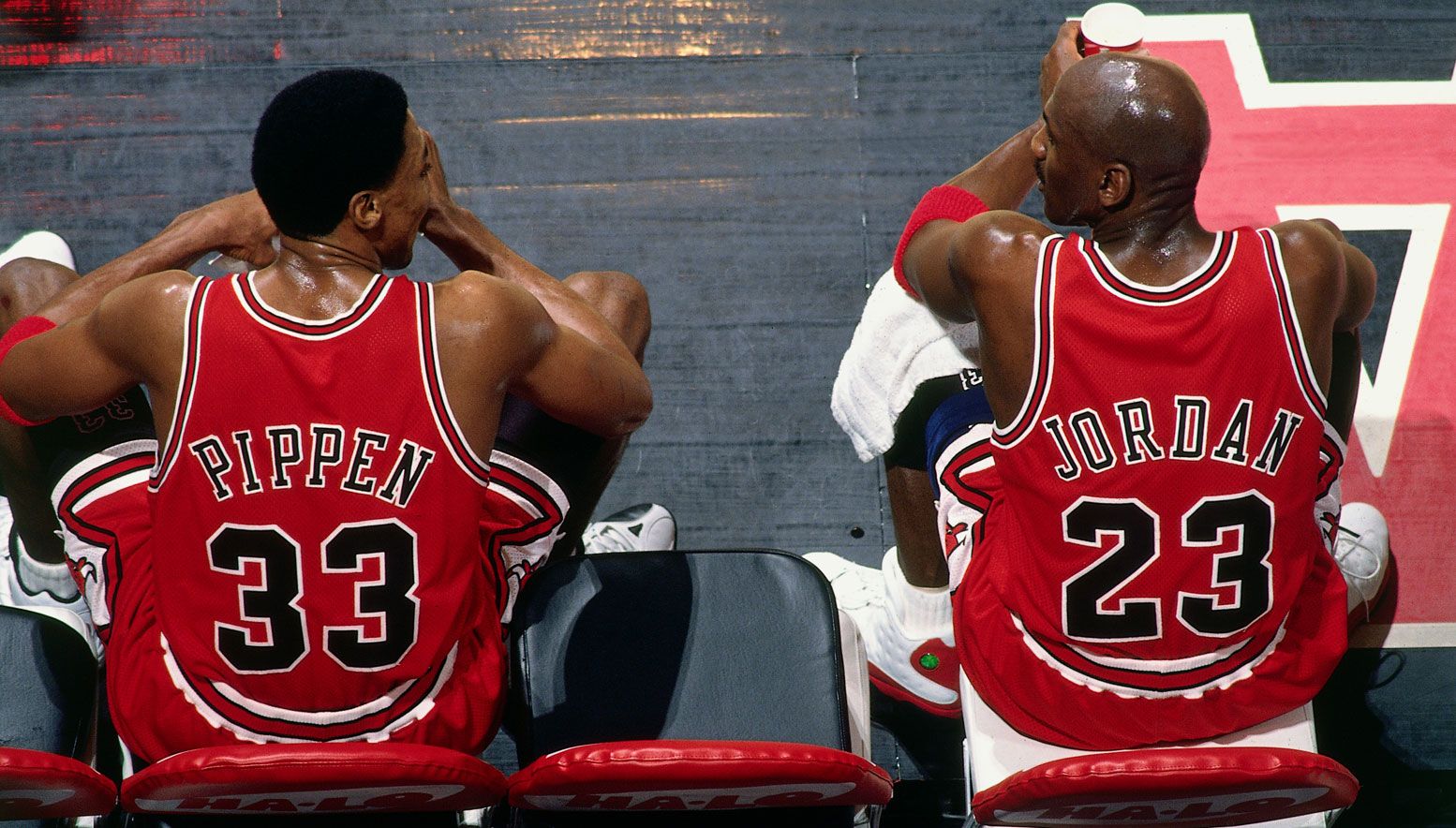
An Arkansas native, Pippen missed the first two months of that 1997-98 season to recover from ankle surgery and was in the midst of a contract dispute. His absence left the Bulls vulnerable.
And that’s when Potapenko and then-rookie point guard Brevin Knight set an early ambush. Drafted 16th overall in 1997 out of Stanford, Knight was entering his seventh NBA game and fourth career start when Jordan’s Bulls arrived in Cleveland on Nov. 11, 1997. Sluggish Chicago was still searching for its first road win three weeks into the season.
Knight, now the Grizzlies’ television analyst, remembers being starstruck and mesmerized when the Bulls strolled onto the court for pregame warm-ups that night in Gund Arena.
“So when they came out, it was literally like in slow motion, man – like you were watching their old championship highlights or something,” Knight said as he reflected on his first encounter with the Last Dance Bulls. “Even our arena music seemed like it slowed down for them.”
Knight laughed as the memories flashed in vivid detail.
“They had the baggy warm-up suits on and Mike doesn’t have the bottom buttons on his pants snapped, so they’re just flailing,” Knight continued. “So being young guys, me and Cedric Henderson are just standing still, out there looking. And our vet, Shawn Kemp, runs by us in the layup line and smacks the hell out of us in the back of our heads. And he’s like, ‘Come on, man! We’ve got a game to play. All of that don’t matter.’ But the initial reaction was amazement.”
Some three decades later, Knight steps into ‘The Last Dance’ with some bragging rights.
They had become mostly a halfcourt team by then, but we could get up and down the floor. And that’s what made it harder for them to play us.
Knight had 10 points and seven rebounds to go with game-highs of seven assists and four steals in 27 minutes as the Cavaliers routed the Pippen-less Bulls, 101-80 that night. Six Cavs scored in double figures, and Potapenko added three points, two rebounds and block off the bench.
It was the most lopsided loss the Bulls suffered in the 1997 calendar year, a 12-month stretch bridging the end of their 69-win season in 1996-97 and the start of their 62-win Last Dance in 1997-98. During a postgame interview from the documentary’s first episodes, Jordan described the Nov. 11, 1997 loss to Cleveland as one the Bulls never really had a chance of winning.
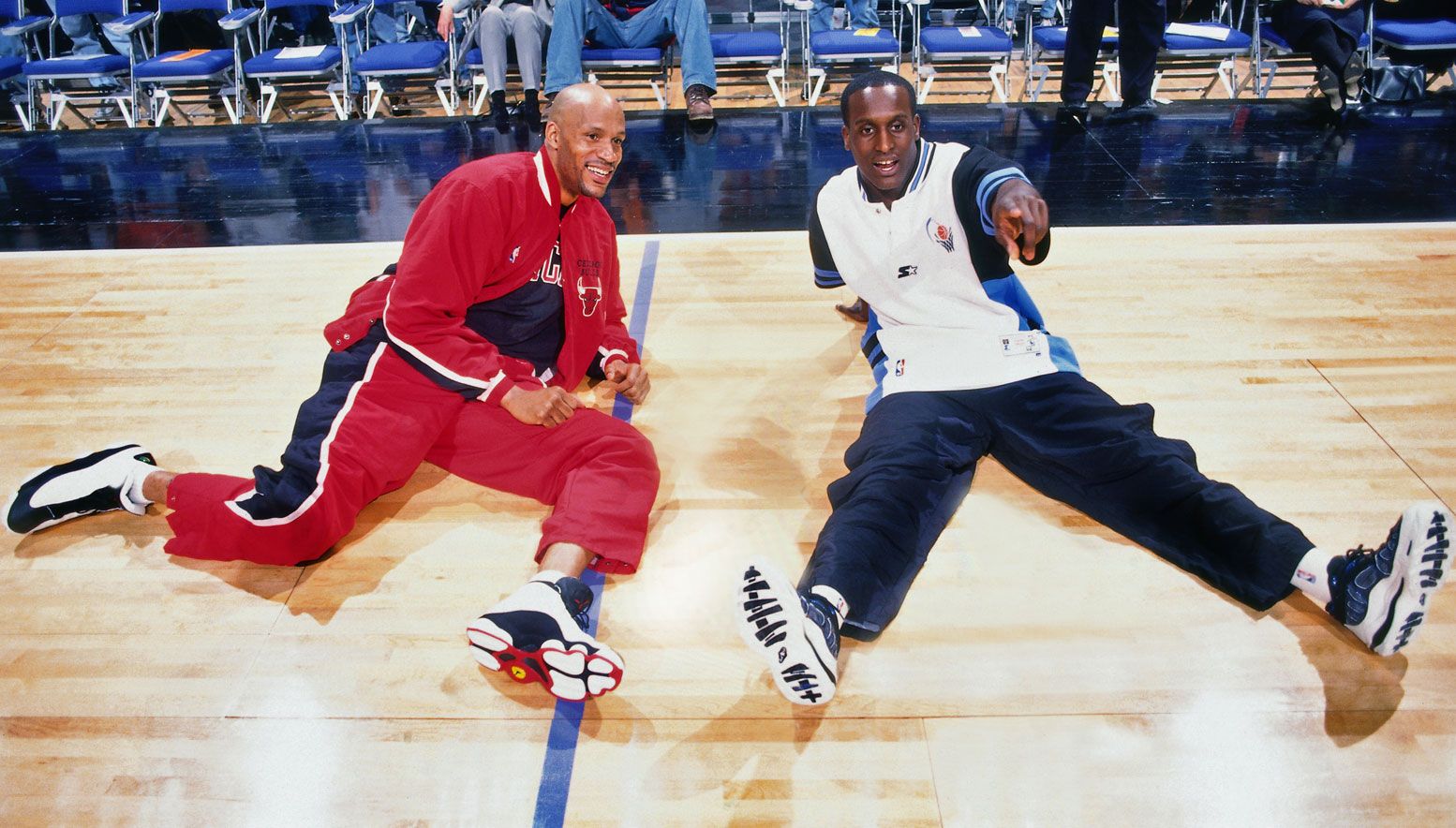
As a rookie starting point guard, Knight guided the Cavs to the playoffs and a first-round series loss to Indiana that season. But it was that 2-2 regular season record against the defending champion, Last Dance Bulls that provided a sense of accomplishment, still resonating today.
“We had some level of success against them because of the style we could play in the speed game,” Knight pointed out. “They had become mostly a halfcourt team by then, but we could get up and down the floor. And that’s what made it harder for them to play us.”
It’s Phil’s last year. Scottie, what was going to happen? Could they keep Dennis under control again? Everything that was going on, I was in the league for then but really didn’t know about it. Now, it’s almost like being able to watch a soap opera over again, but this time watching it outside of your body now.
In the moment, Knight insisted it was hard to really know what those Bulls teams were going through because most opposing players were focused on their own teams. Everyone knew Jordan was an all-time great who most younger players grew up idolizing. Most teams realized the Bulls were nearly unbeatable when they were healthy. But few knew the day-to-day struggles.
For NBA contemporaries like Knight, that makes for a unique Last Dance viewing experience.
“Because that last season for them, which now I see why we were able to win against them early, there was turmoil all around them,” Knight said. “It’s Phil’s last year. Scottie, what was going to happen? Could they keep Dennis under control again? Everything that was going on, I was in the league for then but really didn’t know about it. Now, it’s almost like being able to watch a soap opera over again, but this time watching it outside of your body now.”
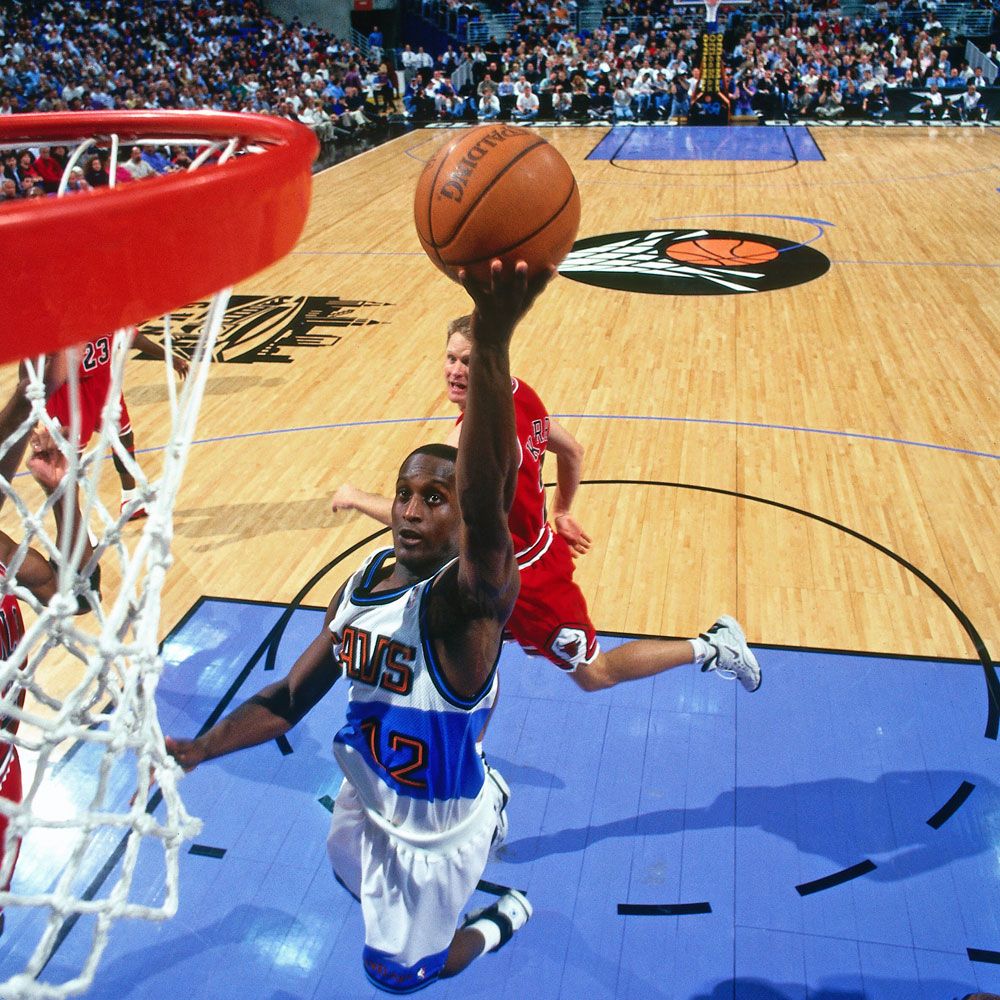
CLEVELAND, OH – APRIL 9: Brevin Knight #12 of the Cleveland Cavaliers goes to the basket against the Chicago Bulls on April 9, 1998 at the Gund Arena. (Photo by David Liam Kyle/NBAE via Getty Images.
The Grizzlies’ connections to ‘The Last Dance’ season go beyond Potapenko’s hard screen on Jordan, Knight’s first win over the Bulls in November and the Jordan-Pippen promotional photo taken in Vancouver the following January. In February of 1998, the Bulls acquired former University of Memphis forward David Vaughn from Golden State. He spent a week with Chicago and played four games during ‘The Last Dance’ season before he was moved on to the Nets.
Perry and Vaughn, who now lives in Orlando, recently caught up on old times over the phone after the first weekend of the documentary. But Perry also watches ‘The Last Dance’ with his own series of “highlight memories” from games with those Bulls rushing back from the past.
During his stint as a point guard in Milwaukee, Perry was an on-court witness for one of Jordan’s better games that season. It was when Bucks star forward Glenn Robinson and Jordan locked into a shootout as each finished with 44 points during a Bulls’ 114-100 win.
Perry saw the same dominant, relentless Jordan he’d always faced. But that Bulls-Bucks clash on Jan. 2, 1998 stands out 22 years later because Perry saw a different side of Robinson. That game between the Central Division rivals, who are separated by just over an hour’s drive, would fuel Robinson for years to come.
But that was a night he accepted the challenge. You saw him go back and forth with Jordan. I was like, ‘You’ve got to play like that every night, Dawg! You’ve got to eat like that every night for us to be able to get over the hump.’
“Being that close to Chicago, they never wanted to lose to us, and that year it seemed like Jordan just willed them to wins with everything going on,” Perry said. “But once Big Dawg (Robinson) locked in, I always considered him capable of scoring with anyone in NBA history.”
Robinson, the top pick from the 1994 draft, didn’t back down that night.
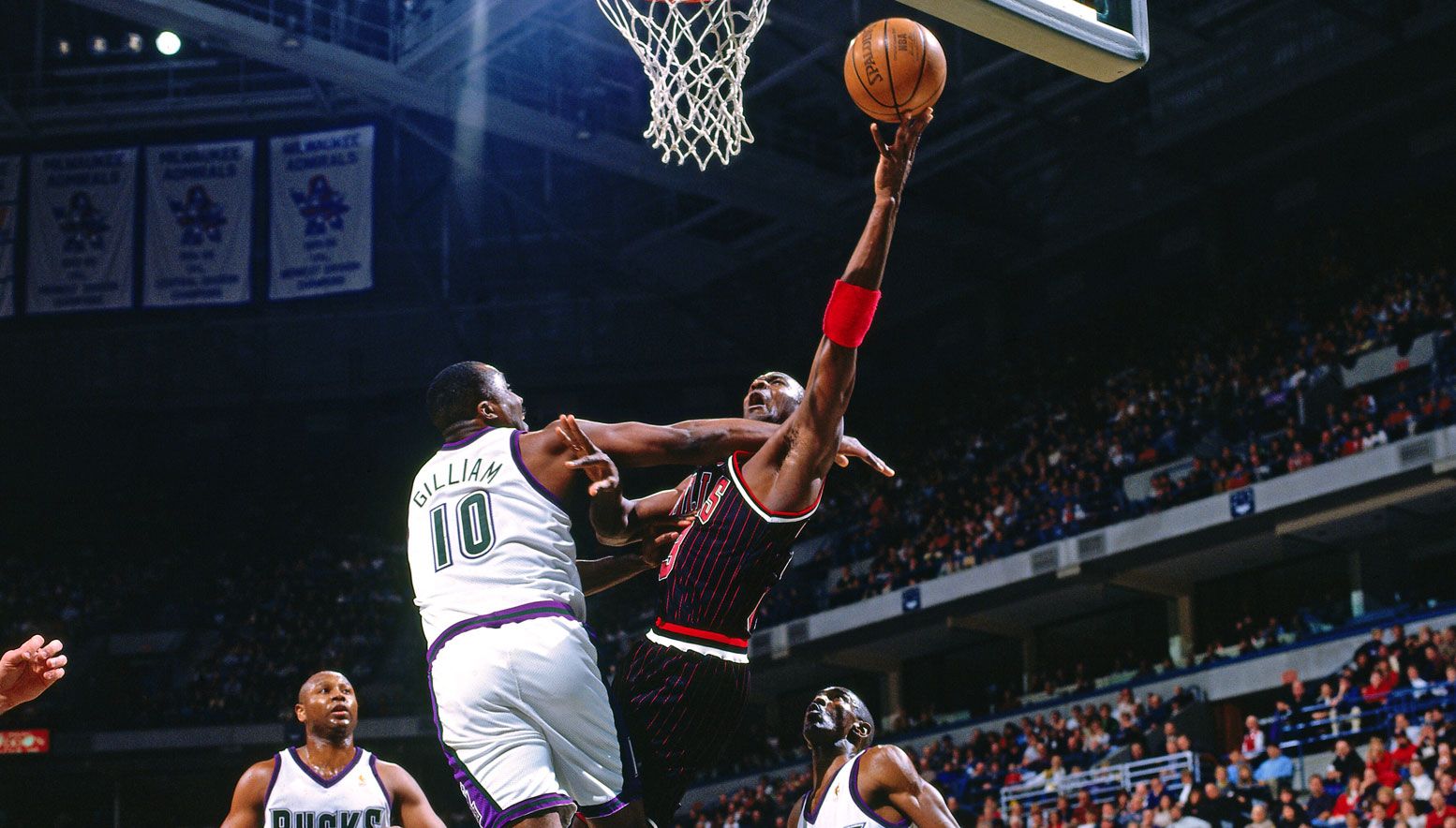
“He was bigger than most everyone, could really shoot it well and could get to all of his spots,” Perry said of Robinson, who would lead the Bucks to the postseason the next three seasons. “But that was a night he accepted the challenge. You saw him go back and forth with Jordan. I was like, ‘You’ve got to play like that every night, Dawg! You’ve got to eat like that every night for us to be able to get over the hump.’”
Even on their last legs, the Bulls still had plenty left to complete The Last Dance.
Jordan’s maniacal competitiveness wouldn’t allow it to go any other way.
Perry would see the same edge from Jordan well into retirement on the golf course. Knight would later play for the same cut-throat and determined Jordan, who took over as owner of the Charlotte Hornets. Zach Kleiman, the Grizzlies executive vice president of basketball operations, once interned in that same Hornets front-office run by Jordan. And Rich Cho, the Grizzlies vice president of basketball strategy, previously spent seven years as Charlotte’s general manager.
Whether by connection or coincidence, the Jordan/Last Dance ties run deep in Memphis. And last week’s episodes that detailed Jordan’s mentoring of Kobe Bryant especially hit home.
Potapenko was drafted with the No. 12 overall pick in 1996, one spot ahead of Bryant. A few weeks before the draft, Potapenko met Jordan for the first time after signing with the same agency that represented the global NBA superstar he idolized from the 1992 Dream Team.
“I shook his hand coming out of college and I was struck,” said Potapenko, who arrived from the Ukraine as a teenager and played two seasons at Wright State before entering the draft. “He was a super idol, even overseas, and we all had posters of him on the wall when we were kids.”
Many of us are adults now.
And Jordan has moved from posters on our walls to a Sunday night fixture on our TVs again.
“I’m on the edge of my seat every week,” Knight assured, “waiting on the next episodes.”
Past or present, ties to those Bulls remain as unflinching as Jordan crashing a Potapenko screen.
It’s why Memphis embraces this chance to relive ‘The Last Dance.’
The contents of this page have not been reviewed or endorsed by the Memphis Grizzlies. All opinions expressed by Michael Wallace are solely his own and do not reflect the opinions of the Memphis Grizzlies or its Basketball Operations staff, owners, parent companies, partners or sponsors. His sources are not known to the Memphis Grizzlies and he has no special access to information beyond the access and privileges that go along with being an NBA accredited member of the media.
